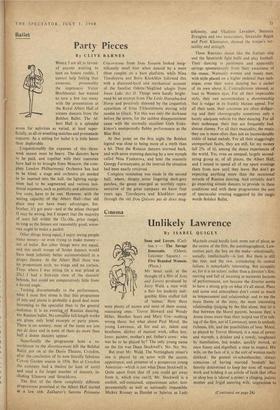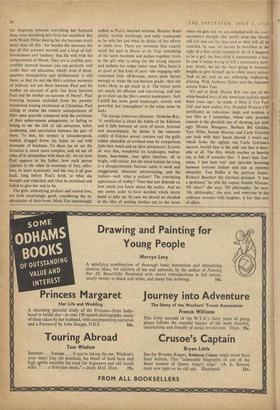Cinema
Unlikely Lawrence
By ISABEL QUIGLY Sons and Lovers. (Carl- ton. ) — The Savage Innocents. (Odeon, Leicester Square.) Five Branded Women. (Plaza.) MY heart sank at the thought of a film of Sons and Lovers produced by Jerry Wald, a man with a flair for leadenly indi- gestible films stuffed full of 'names.' Here there were plenty of names and most of them sound, reassuring ones : Trevor Howard and Wendy Hiller, Heather Sears and Mary Ure—nothing wrong there; but what about Paul Morel, the young Lawrence, all fire and air, talent and brashness, shirker of manual work, office boy, lover, painter, mother's pet, father's cross: who was he to be played by? The only young name on the list was Dean Stockwell's. No. No. No.
But trust Mr. Wald. The Nottingham miner's son is played by an actor 'with the accent, appearance, and presence of a prosperous young American—which is just what Dean Stockwell is. Quite apart from that (if you could get away from it, which you can't), Mr. Stockwell is a coolish, self-contained, unpassionate actor, tem- peramentally as well as nationally impossible. Mickey Rooney as Hamlet or Sabrina as Lady Macbeth could hardly look more out of place, so , the centre of the film, the autobiographical, Law- rentian part, the boy on the make—emotionally, socially, intellectually—is lost. But there is still the rest; and the rest, considering its central failure, is remarkably interesting. But scrappily so, for it is an actors' rather than a director's film, moving and full of meaning at moments because of performances, not because the director seems to have a strong grip on what it's all about. Place and scene and atmosphere don't count as much as temperament and relationship; and to me the main theme of the story, the most interesting relationship (judging by the film alone, that is) is that between the Morel parents, because they, a dozen times more than their insipid son (I'm talk- ing of the film, not of Lawrence), seem to embody richness, life, and the possibilities of love. Morel, as played by Trevor Howard, is a man of power and warmth, a drinker and a rowdy, toughened by humiliation, but tender, quickly moved, at once funny and dignified; a man to respect. His wife, on the face of it, is the sort of woman easily disliked: the genteel ex-schoolteacher, always conscious of having married 'beneath' her, fiercely determined to keep her sons off manual work and holding it an article of faith that office or shop boy is `above' a miner; a clinging, jealous mother and frigid sneering wife, ungracious to (Continued on page 24)
her fingertips towards everything her husband does, even banishing him from her deathbed. But with Wendy Hiller playing her she becomes much more than all this: for besides the neuroses she has all this actress's warmth and a kind of full- bloodedness and 'realness' that fits well with the temperament of Morel. They are a credible pair, credibly married because you can perfectly well credit their old attraction, which, even if three- quarters retrospective and disillusioned, is still there, so that (to me) the film's subtlest moments of jealousy are not those between Paul and his mother on account of girls, but those between Paul and his mother on account of Morel : Paul lowering because excluded from his parents' mysterious teasing excitement at Christmas, Paul failing to realise the relative unimportance of their open quarrels compared with the awfulness of their subterranean antagonism; or failing or hating to see the link of old attraction, habit, tenderness, and association between the pair of them. To him, his mother is misunderstood, wasted, dragged down; his father an oaf with moments of kindness. To them (as to us) the situation is much more complex, and we see all sides of it, sympathise with them all: we see how Paul appears to his father, how each parent appears to the other in moments of fury, affec- tion, or mere monotony; and the way it all goes back, long before Paul's birth, to what she thought and expected, and what he promised and failed to give her and to be.
The girls, embodying profane and sacred love, are both surprisingly good, considering the in- adequacies of their lover; Mary Ure interestingly ardent as Paul's married mistress, Heather Sears pitiful, wistful, touchingly and sadly inadequate as he tells her just what he thinks of her efforts to make love. There are moments that exactly recall her part in Room at Ilw Top. something of the same hardness and pathos together, traits in the girl who is smug for the wrong reasons and pathetic for rather better ones. Miss Sears is so good at this kind of part—the engaging self- contained little off-heroine, never quite heroic enough to make the top heroine grade—that she looks likely to get stuck in it. The minor parts are nearly all efficient and convincing, and just go to show up the film's central inadequacy. Jack Cardiff has some good landscapes, moody and powerful, but 'atmosphere' in the wider sense he lacks.
The Savage Innocents (director : Nicholas Ray; 'A' certificate) is about the habits of the Eskimos and it falls between all sorts of stools, fictional and documentary. Its theme is the innocent oddity of Eskimo sexual customs and the guilt- ridden absurdity of civilised man by comparison (juke-box music and an idiot missionary). It looks all very fine, wonderful ice landscapes, walrus- hunts, bear-hunts, cosy igloo interiors, all in bright, cold colour; but the mind behind the icing is a disappointment, because satire is weak and exaggerated, character unconvincing, and the realism—well, what is realism? The convincing appearance of reality? Then that just depends on how much you know about the reality. And no one seems quite to .have decided which moral stand to take up. In case we should be shocked at the idea of putting mother out to the bears
when she gets old, we are consoled with the com- mentator's thought that pretty soon her family will kill and eat the bear and so they will all be reunited. In case we should be horrified at the sight of a first child exposed to die if it happens to be a girl, the first child is conveniently a boy. In case it seems wrong to kill a missionary, how- ever idiotic, we see the hero going to fantastic lengths to give himself up to white men's justice. And so on. and so on; softening, explaining, diluting. With Anthony Quinn and the Japanese actress Yoko Tani.
It's sad to think Martin Ritt was one of the white-headed boys of the American realistic spurt three years ago : he made A Man is Ten Feet Tall and now makes Five Branded Women ('A' certificate), as ridiculous, inept and tasteless a war film as I remember, whose only possible interest is the ghoulish one of showing just how ugly Silvana Mangano, Barbara Bel Geddes, Vera Miles, Jeanne Moreau and Carla Gravina can look with their heads shaved. I won't say which looks the ugliest, but Carla Gravina's narrow, boyish face is the only one that is bear- able at all. The film, which reaches us heavily cut, is full of remarks like: 'I don't hate Ger- mans, I just hate war' and episodes hovering between extreme sadism and just as extreme absurdity. Van Heflin is the partisan leader, Richard Basehart the German prisoner. 'I was a professor,' he tells his captor, Jeanne Moreau. 'Of what?' she says. 'Of philosophy,' he says. 'Ah, philosophy,' she says, and everyone in the audience screams with laughter; it has that sort of effect.



























































 Previous page
Previous page